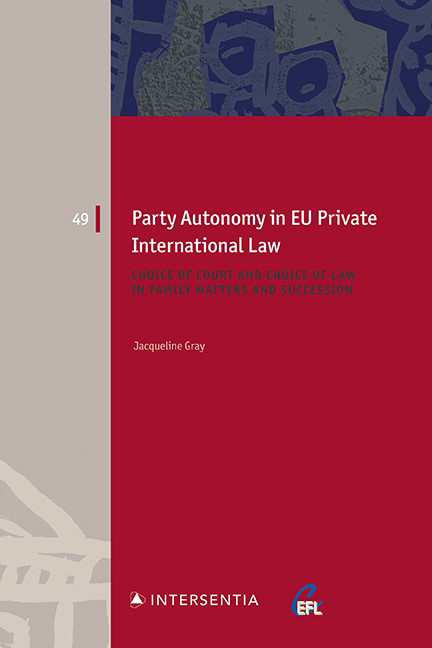 Party Autonomy in EU Private International Law
Party Autonomy in EU Private International Law Chapter 4 - Material and Personal Scope
Published online by Cambridge University Press: 25 May 2021
Summary
INTRODUCTION
As the first step to evaluating the party autonomy provisions within the EU framework of unified rules on family matters and succession, this chapter will establish and analyse the parameters that underpin a choice of court or choice of law in the present setting.
In establishing the material and personal remit of agreements in the present realm, this chapter will begin by considering the prerequisite elements that underlie all situations that fall within the scope of the EU‘s unified rules on crossborder family matters and succession (4.2.), before proceeding to delineate the particular subject matters and parties that the respective instruments concern. Matrimonial matters will be considered first (4.3.), followed by the other major area involving adult relationships: property relations between spouses and registered partners (4.4.). Maintenance obligations (4.5) and parental responsibility (4.6.) will be dealt with next, before finally turning to consider succession (4.7.). By way of exception to the simultaneous approach that is pursued in this book, this present chapter will establish the material and personal scopes of the respective areas of law addressed here on a successive basis.
This chapter will consider the following questions in conjunction with the factors of evaluation established in Chapters 2 and 3: (i) Firstly, how well are the subject areas delineated? What matters are expressly included / excluded in the scope of the respective instruments? And are there any grey areas?(ii) Secondly, what are the connections between the subject areas concerned, and is there any risk of overlap?(iii) Are there any notable absences with regard to the subject matter that need to be addressed?The answers to these questions will be brought together in the synthesis (4.8.).
PRELIMINARY OBSERVATIONS
Before proceeding with the presentation and examination of the respective material and personal scope of the relevant instruments that unify the EU‘s private international law rules on family matters and succession, it is necessary to outline a number of overarching elements which permeate all aspects of the subject matter.
- Type
- Chapter
- Information
- Party Autonomy in EU Private International LawChoice of Court and Choice of Law in Family Matters and Succession, pp. 69 - 112Publisher: IntersentiaPrint publication year: 2021
